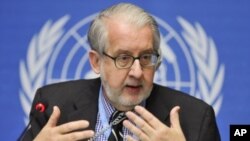The head of the U.N. Human Rights Council’s Commission of Inquiry on Syria says his investigators are finding that Syrians are increasingly victims of military attacks on towns and villages. Earlier in the crisis, victims of the Syrian crackdown tended to be involved in anti-government protests.
The three-member panel is headed by Paulo Pinheiro, a Brazilian human rights expert. He told reporters that in the last week his investigators in the region have conducted 70 interviews and found a shift in the type of violence that has claimed more than 8,000 Syrian lives in the last year.
“There is something different that I would like to stress: it seems to our colleagues that less people interviewed were victims of the excessive use of force during the quelling of protests, while more and more people appear to be killed or injured in the context of military operations against entire villages," said Pinheiro.
He said such attacks appear to be motivated by the pursuit of armed groups or the decision to collectively punish the population of an entire village. He said in some cases, people reported that the village was warned it would be shelled if wanted persons did not surrender. Pinheiro stressed that this is a new development which they are investigating further.
The commissioners also expressed concern about growing numbers of refugees in Lebanon and Turkey. The U.N. refugee agency has registered about 15,000 Syrians in Lebanon and 16,000 in Turkey. A similar number are believed to be in Jordan.
Commission member Karen AbuZayd said that previously, individuals and families were fleeing Syria, but now entire neighborhoods are doing so.
“Now because of what is happening with the battles and the whole cities being emptied, people are coming out as whole groups and in greater numbers as whole villages and so on," said AbuZayd.
The panel noted the increasing number of high-level defections in the Syrian military, including at least four brigadier generals, as an interesting development. They also said they had testimony that during the visit of Arab League observers to Syria in January, some doctors were instructed to drug their patients so they would be unconscious during the monitors’ hospital visits.
The commission has not been granted access to Syria, but Pinheiro said this has not stopped the gathering of reliable information. In addition to interviews with refugees and others with first-hand, verifiable information on the situation, Pinheiro said the commission has also utilized a lot of satellite information.
The commission was appointed last September and has produced two reports. The first said Syrian forces under government orders may have committed crimes against humanity in different parts of the country.
On Friday, the U.N. Human Rights Council extended the mandate of the commission of inquiry for another six months. Friday’s vote in the 47-member Geneva-based Human Rights Council was 41 states in favor, two abstentions and three votes against - Russia, China and Cuba. One delegation was absent.
News
UN Panel: Syrians Victims of Military Attacks




